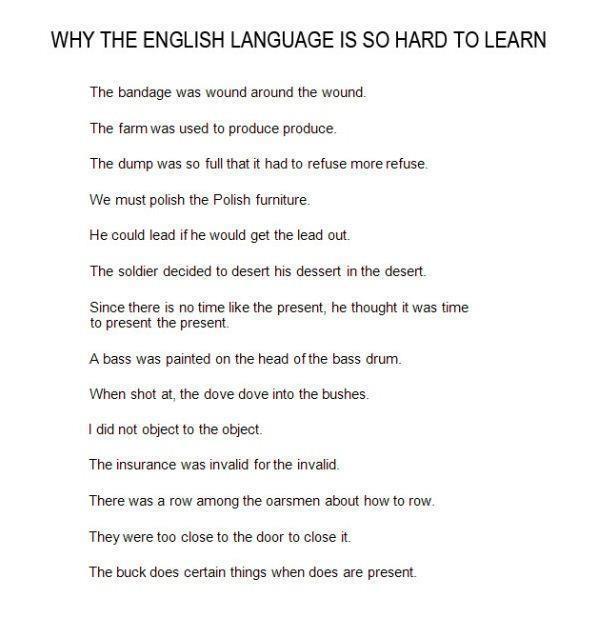
BBC Sherlock Fan Forum - Serving Sherlockians since February 2012.
- JaneCo
- Mycroft's Contact
 Offline
Offline 
- Registered: April 22, 2012
- Posts: 459
For non-native English speakers
Feel very proud
Link address on Twitter is
Last edited by kazza474 (September 8, 2012 11:08 am)
---------------------------------------------------------------------------------------------------------------------------------------------
- Davina
- Moderator
 Offline
Offline 
- From: The Only Way is Essex UK
- Registered: February 9, 2012
- Posts: 9,714
Re: For non-native English speakers
The link or pic thingy isn't showing up properly for me. ![]()
![]()
---------------------------------------------------------------------------------------------------------------------------------------------
Don't make people into heroes John. Heroes don't exist and if they did I wouldn't be one of them.

- SusiGo
- The game is never over (moderator)
 Offline
Offline 
- From: Germany
- Registered: June 5, 2012
- Posts: 22,965
Re: For non-native English speakers
Please, try it again, Jane, I'd love to see it. ![]()
------------------------------
"To fake the death of one sibling may be regarded as a misfortune; to fake the death of both looks like carelessness." Oscar Wilde about Mycroft Holmes
"It is what it is says love." (Erich Fried)
“Enjoy the journey of life and not just the endgame. I’m also a great believer in treating others as you would like to be treated.” (Benedict Cumberbatch)

- Harriet
- Most Human Human Being
 Offline
Offline 
- From: 110A Piccadilly
- Registered: August 24, 2012
- Posts: 9,887
Re: For non-native English speakers
Yea, what appears to be a link probably is just an image of the link....
Last edited by Harriet (September 8, 2012 11:07 am)
Eventually everyone will support Johnlock. Independent OSAJ Affiliate
... but there may be some new players now. It’s okay. The East Wind takes us all in the end.
- kazza474
- High Functioning Sociopath
 Offline
Offline 
- From: Australia
- Registered: February 9, 2012
- Posts: 2,845
Re: For non-native English speakers

____________________________________________________________________________________________
Also, please note that sentences can also end in full stops. The exclamation mark can be overused.
Sherlock Holmes 28 March 13:08
Mycroft’s popularity doesn’t surprise me at all. He is, after all, incredibly beautiful, clever and well-dressed. And beautiful. Did I mention that?
--Mark Gatiss
"I know that you believe you understand what you think I said, but I’m not sure you realize that what you heard is not what I meant."
Robert McCloskey
- Harriet
- Most Human Human Being
 Offline
Offline 
- From: 110A Piccadilly
- Registered: August 24, 2012
- Posts: 9,887
Re: For non-native English speakers
Hooray, more opportunities for blunders! ![]()
Eventually everyone will support Johnlock. Independent OSAJ Affiliate
... but there may be some new players now. It’s okay. The East Wind takes us all in the end.
- SusiGo
- The game is never over (moderator)
 Offline
Offline 
- From: Germany
- Registered: June 5, 2012
- Posts: 22,965
Re: For non-native English speakers
Oh, that's really frustrating ![]() . How about some phonetics to go with it so we don't have to guess?
. How about some phonetics to go with it so we don't have to guess? ![]()
------------------------------
"To fake the death of one sibling may be regarded as a misfortune; to fake the death of both looks like carelessness." Oscar Wilde about Mycroft Holmes
"It is what it is says love." (Erich Fried)
“Enjoy the journey of life and not just the endgame. I’m also a great believer in treating others as you would like to be treated.” (Benedict Cumberbatch)

- Davina
- Moderator
 Offline
Offline 
- From: The Only Way is Essex UK
- Registered: February 9, 2012
- Posts: 9,714
Re: For non-native English speakers
Tricky...very tricky! It bow/bow all over again!
![]()
![]()
---------------------------------------------------------------------------------------------------------------------------------------------
Don't make people into heroes John. Heroes don't exist and if they did I wouldn't be one of them.

- JaneCo
- Mycroft's Contact
 Offline
Offline 
- Registered: April 22, 2012
- Posts: 459
Re: For non-native English speakers
Sorry everyone ![]() . Thought I had posted correctly and then had to dash off to deliver daughter somewhere for 12.00 *rolls eyes* so I've only just discovered the error. Thanks to Kazza for knowing what to do in an emergency.
. Thought I had posted correctly and then had to dash off to deliver daughter somewhere for 12.00 *rolls eyes* so I've only just discovered the error. Thanks to Kazza for knowing what to do in an emergency. ![]()
---------------------------------------------------------------------------------------------------------------------------------------------
- •
- kazza474
- High Functioning Sociopath
 Offline
Offline 
- From: Australia
- Registered: February 9, 2012
- Posts: 2,845
Re: For non-native English speakers
S'ok, easily fixed.
All part of the service.![]()
____________________________________________________________________________________________
Also, please note that sentences can also end in full stops. The exclamation mark can be overused.
Sherlock Holmes 28 March 13:08
Mycroft’s popularity doesn’t surprise me at all. He is, after all, incredibly beautiful, clever and well-dressed. And beautiful. Did I mention that?
--Mark Gatiss
"I know that you believe you understand what you think I said, but I’m not sure you realize that what you heard is not what I meant."
Robert McCloskey
- Lestrade
- Shooting The Wall
 Offline
Offline 
- From: Sherlock's Mind Palace
- Registered: September 6, 2012
- Posts: 13
Re: For non-native English speakers
This reminds me a lot of a poem we once discussed at university:
Dearest creature in creation,
Study English pronunciation.
I will teach you in my verse
Sounds like corpse, corps, horse, and worse.
I will keep you, Suzy, busy,
Make your head with heat grow dizzy.
Tear in eye, your dress will tear.
So shall I! Oh hear my prayer.
Just compare heart, beard, and heard,
Dies and diet, lord and word,
Sword and sward, retain and Britain.
(Mind the latter, how it's written.)
It goes on and on and on...
Finally, which rhymes with enough,
Though, through, plough, or dough, or cough?
Hiccough has the sound of cup.
My advice is to give up!!!
--------------------------------------------------------------------------------------------------------------------------------
"Smart is the new sexy."
I disagree. To me, smart has *always* been sexy.
- Mattlocked
- One More Miracle
 Offline
Offline 
- From: Germany
- Registered: June 29, 2012
- Posts: 6,781
Re: For non-native English speakers
The complete one is to find here:
Just showed it to hubby and he immediately started reading out loud the whole thing. (I think he wanted to show off ![]() ). Well, he managed quite a lot.
). Well, he managed quite a lot. ![]()
And I wonder why it is Suzy but buzy and daughter but laughter and some but home and and and.... Are there one million rules?
Last edited by Mattlocked (September 8, 2012 1:09 pm)
__________________________________
"After all this time?" "Always."
Good bye, Lord Rickman of the Alan
- JaneCo
- Mycroft's Contact
 Offline
Offline 
- Registered: April 22, 2012
- Posts: 459
Re: For non-native English speakers
The only rule seems to be that there isn't one. I must be brighter than I thought, I picked it all up as a baby ![]()
---------------------------------------------------------------------------------------------------------------------------------------------
- •
- SusiGo
- The game is never over (moderator)
 Offline
Offline 
- From: Germany
- Registered: June 5, 2012
- Posts: 22,965
Re: For non-native English speakers
Mattlocked, how about a little revenge? Shall we tell them about the three grammatical genders in German? ![]()
------------------------------
"To fake the death of one sibling may be regarded as a misfortune; to fake the death of both looks like carelessness." Oscar Wilde about Mycroft Holmes
"It is what it is says love." (Erich Fried)
“Enjoy the journey of life and not just the endgame. I’m also a great believer in treating others as you would like to be treated.” (Benedict Cumberbatch)

- Mattlocked
- One More Miracle
 Offline
Offline 
- From: Germany
- Registered: June 29, 2012
- Posts: 6,781
Re: For non-native English speakers
Wait - I have to look up the word "gender". LOL
Edit: Ah okay, it means the same in the grammatical context as it does usually... ![]()
Well... we could make a kind of quiz!?!
Last edited by Mattlocked (September 8, 2012 2:53 pm)
__________________________________
"After all this time?" "Always."
Good bye, Lord Rickman of the Alan
- Lestrade
- Shooting The Wall
 Offline
Offline 
- From: Sherlock's Mind Palace
- Registered: September 6, 2012
- Posts: 13
Re: For non-native English speakers
Mattlocked wrote:
And I wonder why it is Suzy but buzy and daughter but laughter and some but home and and and.... Are there one million rules?
In a nutshell: different etymologies. English, while being a Germanic language in origin, has assimilated and adapted words from all kinds of languages. /end smart-alec mode
--------------------------------------------------------------------------------------------------------------------------------
"Smart is the new sexy."
I disagree. To me, smart has *always* been sexy.
- The Doctor
- British Government
 Offline
Offline 
- From: Baker Street, Sydney Australia
- Registered: June 27, 2012
- Posts: 674
Re: For non-native English speakers
Lestrade wrote:
In a nutshell: different etymologies. English, while being a Germanic language in origin, has assimilated and adapted words from all kinds of languages. /end smart-alec mode
So has German.. Portemonnaie comes to mind (French for money purse).. I am citing a thesis here:
"Die Fremdwörter machen heute einen gehörigen Teil des deutschen Wortschatzes aus. Es sind vor allem lateinische und englische Ausdrücke. Der Anteil der Fremdwörter ist etwa 25 %, wobei viele dieser Wörter, besonders aus dem Griechischen und Lateinischen, nicht mehr als "fremd" aufgefasst werden. Es gibt ungefähr 10 % wirklich "fremd" Wörter im Deutschen. Die Substantive stehen an der Spitze, dann folgen die Adjektive und Verben.
Fremde Wörter gelangen aufgrund des Kontaktes zwischen mehreren Sprachgemeinschaften in eine andere Sprache oder aufgrund kultureller, wirtschaftlicher oder politischer Beziehungen (Handelsbeziehungen zwischen unterschiedlichen Sprachgemeinschaften bzw. Völkern). Das Verbreitungsgebiet einer Sprache ist kein abgeschlossener Raum, sondern es steht in Verbindung mit den angrenzenden anderen Sprachgruppen. Deutsch besitzt eine Reihe Wörter von Nachbarsprachen."
- Mattlocked
- One More Miracle
 Offline
Offline 
- From: Germany
- Registered: June 29, 2012
- Posts: 6,781
Re: For non-native English speakers
And i'm sure Susi can translate this for the others. ![]()
__________________________________
"After all this time?" "Always."
Good bye, Lord Rickman of the Alan
- The Doctor
- British Government
 Offline
Offline 
- From: Baker Street, Sydney Australia
- Registered: June 27, 2012
- Posts: 674
Re: For non-native English speakers
Summarising it states that the German language has assimilated many words from 'foreign' languages too, which nowadays account for up to 25% of the overall vocabulary (mainly Latin and English). Most of these words came from cultural, economic and political relationships with the 'donating' countries. Every language is influenced by external lingual communities and not isolated.
*vocabulary*
*lol*
Got that one?
- Davina
- Moderator
 Offline
Offline 
- From: The Only Way is Essex UK
- Registered: February 9, 2012
- Posts: 9,714
Re: For non-native English speakers
A fair amount of Greek words too.
![]()
---------------------------------------------------------------------------------------------------------------------------------------------
Don't make people into heroes John. Heroes don't exist and if they did I wouldn't be one of them.


 1
1 